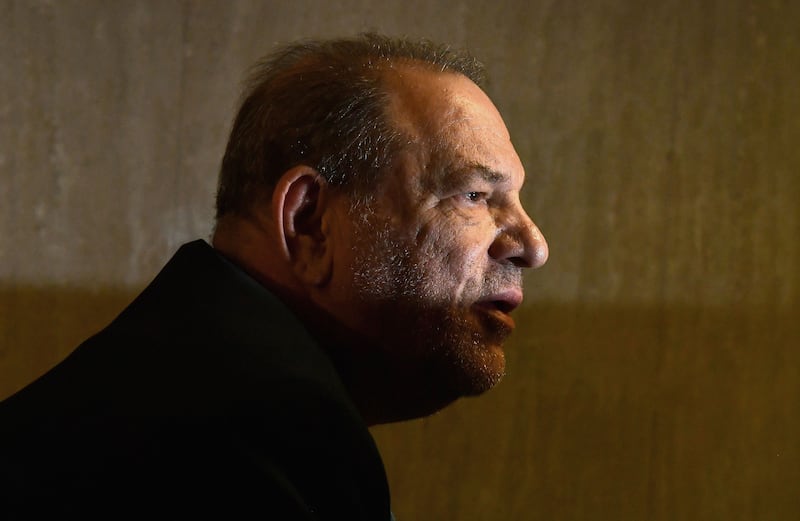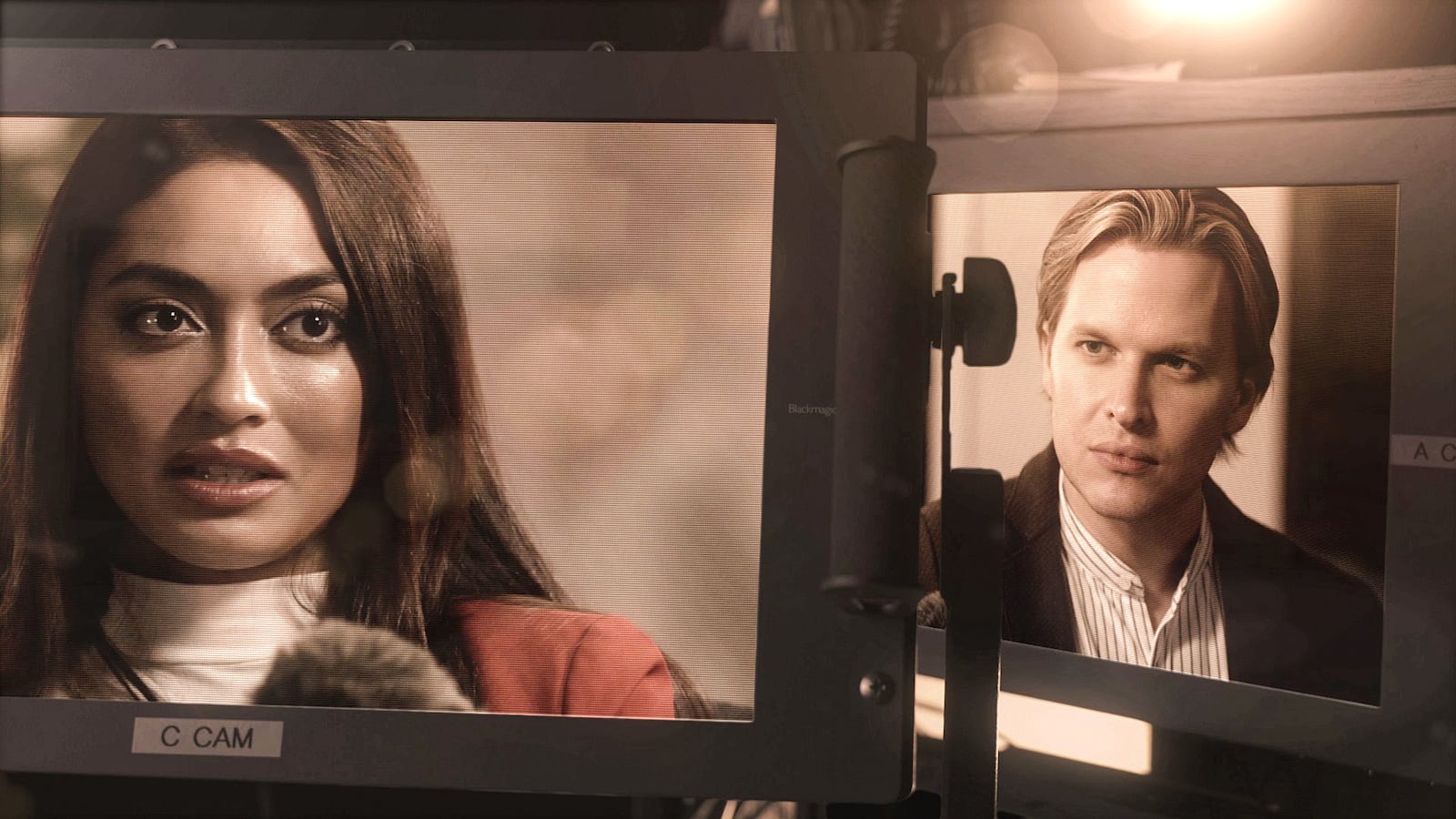Harvey Weinstein’s movie empire came crashing down in October 2017 following the one-two punch of exposés by The New York Times’ Jodi Kantor and Megan Twohey, and Ronan Farrow’s damning investigative report in The New Yorker.
In the following months, the Miramax mogul was branded a monster after an overwhelming number of women detailed how he sexually harassed, assaulted, and raped them, which ultimately led to his conviction in 2020 and sentencing to 23 years in prison.
At least 100 women, including actresses Rose McGowan, Gwyneth Paltrow, Lupita Nyong’o, and Uma Thurman, detailed their experiences with the serial predator. Their stories, along with the 63 brave women who accused comedian Bill Cosby of sexual assault, helped spark the worldwide #MeToo movement that sought to finally hold powerful men in Hollywood accountable for their heinous actions.
But there was much more to the story behind Farrow’s Pulitzer-winning work—something the journalist is not about to let his old bosses at NBC News forget.
In his new HBO docuseries Catch and Kill: The Podcast Tapes, which premieres July 12, Farrow doesn’t hold back from accusing the network of cozying up to Weinstein and derailing his story—but stops shy of connecting the dots like he did in his 2019 book of the same name.
Farrow claimed that NBC News’ top brass irresponsibly folded for Weinstein because not only was he personally lobbying executives to kill the story and threatening to bury the network in lawsuits, but he also used the then-private sexual-assault allegations against Today show host Matt Lauer as leverage.
Longtime New Yorker reporter Ken Auletta, who had previously failed to make a sexual-assault claim against Weinstein stick in a 2002 profile of the producer, says the “prophetic” words directly in the docuseries. “If NBC, which has the evidence, doesn’t go forward with this story, it’s a scandal,” he told Farrow in a previously filmed interview for Farrow’s Weinstein story when it was at NBC.
In the HBO docuseries, which gives a behind-the-scenes look at Farrow’s reporting process, Farrow brings up his grievances with NBC News early on, detailing in Episode 2 how he first began circling the Weinstein story.
At the time, Farrow was working in a freelance capacity for NBC News’ Investigative Unit, after his show with MSNBC was cancelled. He reported from the road, covering stories with producer Rich McHugh.
Farrow had been itching to do a series covering Hollywood abuse, presumably after hearing a variety of horror stories about the industry over the years, given his movie star-mother Mia Farrow and director-father Woody Allen, himself an accused pedophile.
But his pitches kept getting shot down, the network apparently squeamish on the topics of race and pedophilia. But Farrow kept at it, focusing his next story on the “Hollywood casting couch,” where women are pressured to perform sexual favors for powerful men in order to further their careers.
This time, NBC News President Noah Oppenheim was interested, and even suggested that Farrow reach out to actress Rose McGowan, who had been tweeting about a traumatic assault by a powerful studio head over the years.
Over the next eight months, the story broadened to include not just McGowan’s claims against Weinstein, but several others’ accounts. He cultivated more and more sources who could speak to Weinstein’s pattern of sexual harassment, assault, and silencing his victims with large cash settlements.
Near the end of his reporting process, and after securing an eye-opening 2015 audio recording of Weinstein allegedly admitting he had groped Filipino-Italian model Ambra Battilana Gutierrez, Farrow and McHugh went to Oppenheim to lay out the story. That’s when NBC News got nervous, according to Farrow in Catch and Kill.
Eventually, after several back-and-forth meetings and thinly veiled suggestions to put the story on ice, Farrow and McHugh were given the final word on Aug. 8, 2017: they were to stop reporting on Weinstein for NBC News.
Fed up, Farrow took his reporting over to The New Yorker’s David Remnick and Deirdre Foley-Mendelssohn. After spending the next several weeks fine-tuning his draft, submitting to extensive fact-checking, and sitting through a tense call with Weinstein and his lawyers, Farrow’s extraordinary report was published.
He did not hide his disdain for NBC News execs when he went on MSNBC host Rachel Maddow’s show days after publication to talk about the story and how it reportedly wasn’t up to the network’s standard.
“I walked into the door at The New Yorker with an explosively reportable piece that should have been public,” he lamented. “In fact, there were multiple determinations at NBC that it was reportable.”
(NBC News has denied this, with Oppenheim telling The New York Times: “Farrow’s effort to defame NBC News is clearly motivated not by a pursuit of truth, but an ax to grind. It is built on a series of distortions, confused timelines and outright inaccuracies.” The network further alleged that “[Farrow] did not yet have a single victim of—or witness to—misconduct by Weinstein who was willing to be identified” while at NBC. Farrow refutes these claims, and no stories or the book version of Catch and Kill were forced to issue any corrections.)
It would take two years for the slippery details surrounding the closed-door conversations that prevented the Weinstein piece from moving forward at NBC News to be made public in Farrow’s book.
He claimed he learned from sources with direct knowledge that three top NBC executives had up to 15 conversations with Weinstein, assuring him the reporting had been stopped in its tracks.
Former chairman of NBCUniversal Steve Burke had reportedly told another executive the network couldn’t move forward with Farrow’s story because he’d be “getting these calls from Harvey for the next year,” the docuseries alleges.
And Andy Lack, former chairman of NBC News, allegedly had a phone call with Weinstein where the movie producer ranted about Farrow, calling him Lack’s boy, and said the claims he was investigating were all from the 1990s. “We all did that,” Weinstein allegedly argued.
“I’m very clear about the fact that Harvey was laying siege to NBC,” Farrow told The Hollywood Reporter in 2019. “I don’t mean that all of them all of the time were dying to get these calls. But I think what is inappropriate is the way in which they continued to take those calls, and in some cases meetings, and to engage with him in a warm and friendly way that was then concealed as they killed the story.”
As McHugh put it for Vanity Fair, NBC News executives “behaved more like members of Weinstein’s PR team than the journalists they claim to be.”
The deeper Farrow dug, the cozier NBC’s top brass got with Weinstein, according to Catch and Kill. Oppenheim, who has flirted with a screenwriting career in Hollywood, penning the 2016 film Jackie starring Natalie Portman and The Divergent Series: Allegiant, had once even shared a table with Weinstein for a Time magazine gala.
Shortly after Farrow left NBC News due to the network killing his story, Weinstein sent a congratulatory email to Oppenheim over former Fox News host Megyn Kelly’s new morning show along with a bottle of Grey Goose vodka, according to the Catch and Kill book.

Harvey Weinstein arrives at the Manhattan Criminal Court, on February 24, 2020 in New York City.
Angela Weiss/AFP/GettyBut the biggest bombshell came when Farrow claimed that Weinstein became aware of serious sexual-assault allegations against Matt Lauer and how NBC paid off his accusers. According to Catch and Kill, Weinstein allegedly used this information as leverage against NBC.
“Weinstein made it known to the network that he was aware of Lauer’s behavior and capable of revealing it,” Farrow writes in Catch and Kill.
Coincidentally, a month after the Weinstein story was broken, NBC News fired Lauer, with Lack saying two days earlier that the network’s HR had “received a detailed complaint from a colleague about inappropriate sexual behavior in the workplace” by Lauer. The former morning show host has denied any allegations of sexual assault.
Meanwhile, Oppenheim, who used to run Today, insisted to the NBC News newsroom that he was unaware of any sexual-misconduct allegations against Lauer. “There has not been an allegation made internally in 20 years in terms of through the HR channels and any place where there would be a record of such a thing,” he said, according to Vanity Fair.
But in his book, Farrow included several other accounts from former NBC employees who made sexual-harassment claims against Lauer, saying they informed their higher-ups at the network, which NBC has denied numerous times.
After the dust had settled, Lack announced he was leaving NBC News in May 2020 and Burke announced he would be retiring in August 2020. Oppenheim remains in his position as NBC News president, although was passed up for a promotion as chairman of MSNBC and NBC News .
With Farrow devoting chunks of time in his new HBO docuseries to NBC News’ deep moral failure, it’s clear he’s never going to let NBC live down killing a story that helped shape a cultural movement.


